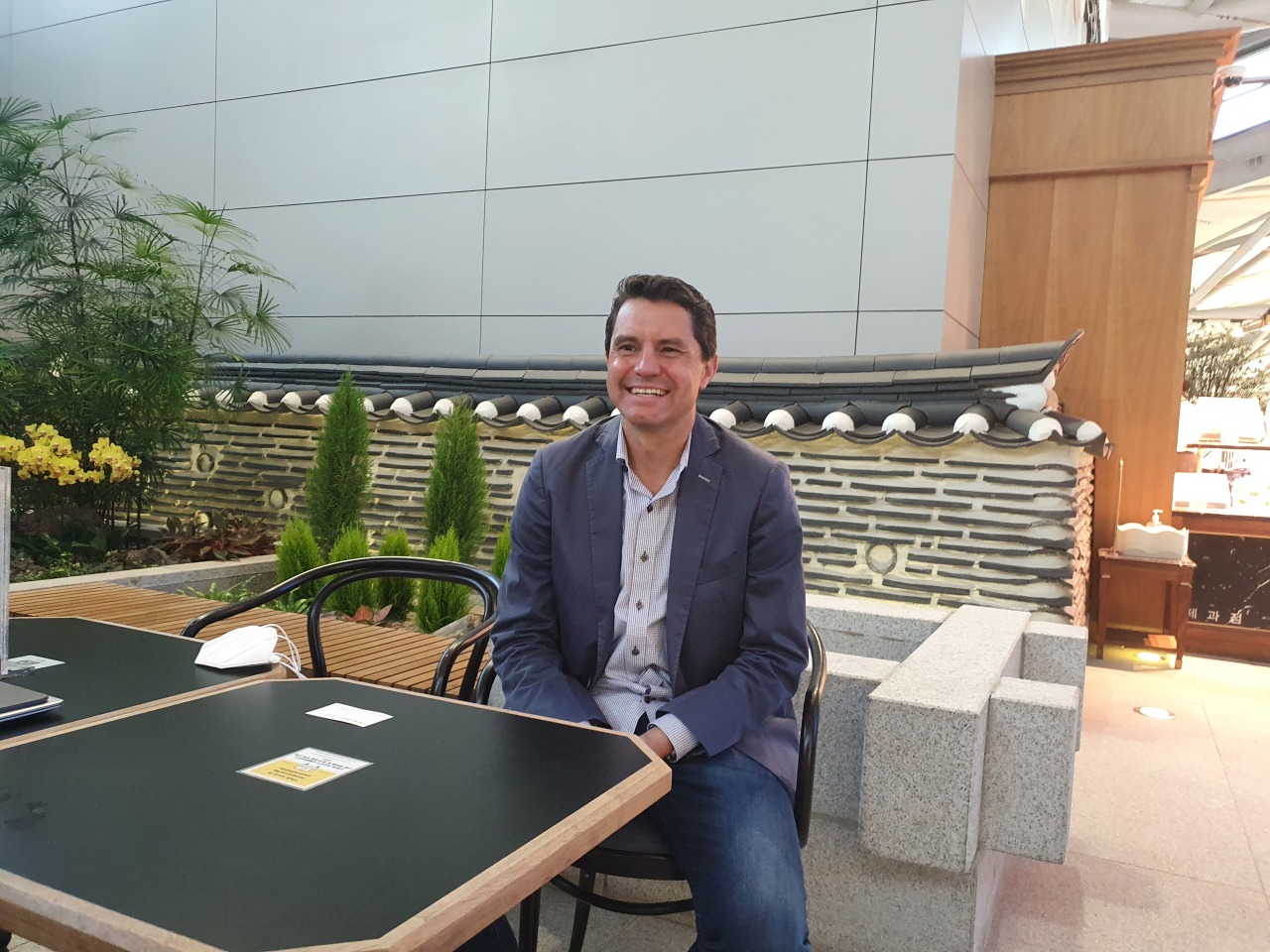[Battery+] Solid-state batteries will give new life to petrochemical waste: Solid Power CEO
Partnered up with SK Innovation, US battery developer charges ahead for “game-changing” energy storage tech
By Kim Byung-wookPublished : Oct. 31, 2021 - 15:57

Petrochemical companies generate waste called hydrogen sulfide at their facilities and even pay money to dispose of the highly toxic gas.
But what if this unwanted byproduct could be converted into a raw material for green energy?
Doug Campbell, co-founder and CEO of Solid Power, one of the world’s most promising advanced battery developers, suggests that solid-state batteries will give new purpose to materials that had been neglected before.
“A company like SK (Innovation) produces tons and tons of hydrogen sulfide gas, and right now they have to pay to dispose of it. You could potentially take what is now a liability and turn it into an asset,” the executive said during an interview with The Korea Herald on Thursday.
“Solid-state battery material is expensive today. The reason is that there is no market, not because it is inherently expensive to produce. It’s just the opposite.”
The interview was conducted at Incheon Airport, while the CEO was waiting to head back to his Colorado-based firm. Just hours prior, he had signed a deal with SK Innovation to jointly develop and produce all-solid-state cells, billed as the next-generation battery.
Under the partnership, the Korean firm could potentially supply hydrogen sulfide gas to Solid Power. Asked what Solid Power could offer in return, the CEO said, “acceleration,” without a moment of hesitation.
“If this partnership continues to work in the manner we anticipate, we anticipate mass production (of solid-state batteries) well before 2030, absolutely,” Campbell said.
Among the South Korean battery trio, SK Innovation has the most conservative timeline for the commercialization of solid-state batteries. SK Innovation’s target is 2030, which is still several years behind Samsung SDI and LG Energy Solution’s 2027.
Solid-state and lithium-ion batteries are made of four key components -- cathodes, anodes, electrolytes and separators. The major difference is, as the name suggests, solid-state batteries contain solid electrolytes, not liquid ones. Hydrogen sulfide gas is the raw material for solid electrolytes.
This simple change in chemistry makes solid-state batteries lighter, more powerful, and above all, fireproof.
Under the agreement, the two firms will work together to develop and produce solid-state batteries with an energy density of at least 930 watt-hours per liter, which would increase the driving range of electric vehicles to 930 kilometers on a single charge.
Even better, unlike lithium-ion batteries, which require expensive metals such as cobalt and nickel, solid-state batteries being developed by Solid Power replace those two expensive metals with an Earth-abundant material called pyrite, which is made of iron and sulfur.
“Lithium-ion batteries are dominated by the cost of nickel and cobalt. Pyrite is incredibly cheap, I jokingly say it’s cheap as dirt because it is literally dirt. So the cost, and I’m not exaggerating when I say this, can be reduced by 90 to 95 percent,” Campbell said.

“Coming from Colorado, there’s pyrite everywhere. The whole mountains are full of pyrite, it’s everywhere. And so from our perspective, we view the pyrite to work as being a game changer more for economic reasons.”
To unlock the full potential of solid-state batteries, existing chemistries used for lithium-ion batteries such as nickel cobalt manganese or nickel cobalt aluminum are inappropriate.
To reach energy densities as high as 500 watt-hours per kilogram, or even 600 watt-hours per kilogram, solid-state batteries require new chemistries, and pyrite is one of the most promising candidates. With existing chemistries, Campbell said, “The math doesn’t work out, it’s just science.”
“Any innovative technology that we work on in solid-state would eventually come under the umbrella of this cooperation agreement (with SK Innovation),” Campbell said, implying that pyrite solid-state batteries can be SK Innovation’s future batteries.
The CEO added that another key strength of pyrite solid-state batteries is thermal stability. Compared to lithium-ion batteries, which have to be kept at around 35 degrees Celsius to deliver on the promised lifetime, pyrite solid-state batteries can withstand heat as high as 70 degrees Celsius without life degradation.
“As they can tolerate heat, we and our automaker partners believe that there will be no need for pack cooling. That alone is about a 10 percent cost savings,” Campbell said.
Of course, Campbell mentioned that pyrite solid-state batteries have challenges to overcome, such as low voltage issues. Pyrite solid-state batteries exhibit low voltage and are therefore incapable of rapid charging.
“Automakers don’t want to change the original voltage profile. But this can be addressed with bipolar designs, which doubles the nominal voltage, but that needs to be developed,” Campbell said.


















![[Today’s K-pop] Treasure to publish magazine for debut anniversary](http://res.heraldm.com/phpwas/restmb_idxmake.php?idx=642&simg=/content/image/2024/07/26/20240726050551_0.jpg&u=)